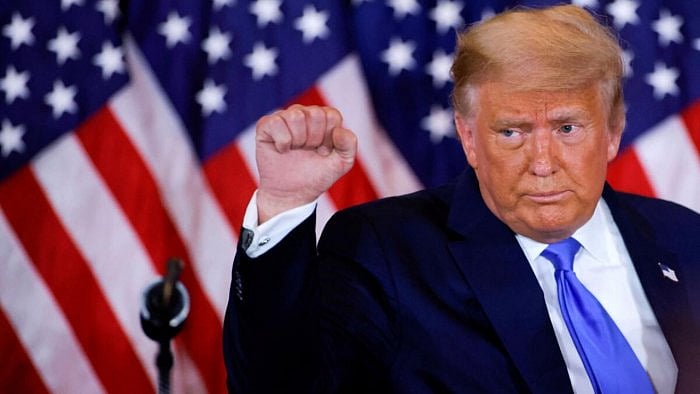
Donald Trump.
Credit: Reuters File Photo
Former President Donald Trump was indicted for a fourth time Monday, this time over what prosecutors in Atlanta described as his and his allies’ efforts to unlawfully undo his election loss in Georgia in 2020.
The indictment follows a lengthy investigation by Fani Willis, the Fulton County district attorney, and includes 13 charges against Trump, as well as charges against 18 other Trump allies who Willis said were part of a “criminal enterprise” seeking to overturn the Georgia election results.
Here’s what to know.
Trump was charged under Georgia’s RICO Act.
Prosecutors charged Trump and his allies under the state’s Racketeer Influenced and Corrupt Organizations Act, which allows them to tie together various crimes committed by different people by arguing that they were acting together for a common criminal goal.
Georgia’s RICO Act is patterned after a federal law that was passed to combat organized crime groups but in recent years has been used effectively in white-collar crime and political corruption cases.
At its heart, the statute requires prosecutors to prove the existence of an “enterprise” and a “pattern of racketeering activity.” Willis said 19 defendants were part of a criminal enterprise that tried to “accomplish the illegal goal of allowing Donald J. Trump to seize the president’s office.”
Among those charged: Rudy Giuliani and Mark Meadows.
The charges outlined in the indictment reach far beyond Trump to some of his closest allies. They include Meadows, who was Trump’s former chief of staff, and Giuliani, the former New York City mayor and lawyer for Trump.
Also charged are several more lawyers who are accused of working to try to overturn the election: Sidney Powell, who once promised to “release the Kraken” in exposing purported election fraud; John C. Eastman, who helped promote the idea of using bogus Trump electors in states where Trump lost; and Kenneth Chesebro, who also played a central role in that effort.
The sprawling nature of the racketeering case is noted in the indictment, with prosecutors citing conduct in Michigan, Arizona and Pennsylvania that they say furthered the defendants’ efforts to keep Trump in power.
Willis said late Monday that she plans to try all 19 defendants together.
The charges fall into several baskets.
The indictment bundles together several efforts by Trump and his allies to reverse the election results in Georgia. None of the 19 defendants is accused of taking part in all of those different schemes, but under the RICO law, prosecutors have to prove only that each one broke state laws as part of a continuing criminal enterprise with the same overarching goal.
Several of the individual counts stem from false claims of election fraud that Giuliani and two other Trump lawyers, Robert Cheeley and Ray Smith, made at legislative hearings in December 2020.
Another batch of charges concerns a plan Trump’s supporters carried out to vote for a false slate of pro-Trump electors and send a forged document to Congress claiming those electors were legitimate.
A third raft of charges accuses several Trump allies of conspiring to steal voter data and tamper with voting equipment at the elections office in Coffee County, Georgia.
Some of the defendants were charged only in connection with a bizarre scheme to harass and intimidate an election worker, Ruby Freeman, whom Trump and his allies had wrongfully accused of fraud.
The district attorney is giving Trump 10 days to turn himself in.
Willis said Monday that she was giving Trump until noon on Aug. 25 to surrender in Fulton County, where he would be arraigned on the charges and enter a plea.
When Trump was indicted in New York, he was able to surrender and avoid some of the standard procedures for most people who are arrested, such as having his mug shot taken and being handcuffed.
Patrick Labat, the Fulton County sheriff, said this month that unless he was told otherwise, Trump would be booked in the same way as any other defendant.
Still, the Secret Service could try to change the sheriff’s plans.
Trump blasted the indictment and questioned the prosecutor’s motive.
Trump lashed out at Willis after the indictment, suggesting that she had charged him to further her own political standing and seizing on the fact that an improper copy of the indictment had reportedly been uploaded to a court website even before the grand jurors voted.
Earlier in the day, Reuters reported that a document that appeared to be a docket entry for an indictment against Trump had been posted, and then removed, from the Fulton County court’s website. A spokesperson for the court called the document “fictitious,” and the court clerk, Ché Alexander, declined to discuss what had happened in detail.
Trump and his allies said it was a sign that the prosecution saw the grand jury’s vote, which took place later in the day, as a foregone conclusion.